Mentoring Report: Evaluation of Mentoring Practices and Resources
VerifiedAdded on 2023/06/08
|10
|2911
|236
Report
AI Summary
This report provides a comprehensive analysis of mentoring, coaching, and teaching, highlighting their similarities and differences. It outlines the role of a mentor, emphasizing the importance of identifying student needs and implementing tailored learning styles. The report also details the resources required for an effective multi-agency approach, including specific support for literacy, in-house resources, internet access, specialist counseling, and resources for special learning needs. Factors influencing the referral process, such as student needs, mentor competence, and resource availability, are also examined. Furthermore, the report evaluates the effectiveness of the mentor's practices, including strengths like active listening and goal identification, and weaknesses like motivational aspects and opportunities. An action plan is provided to address areas for improvement, focusing on inspirational skills, providing opportunities, and specialist knowledge. The report concludes by emphasizing the importance of mentoring, coaching, and teaching in supporting students and achieving their goals, as well as the need for continuous evaluation and improvement.

Report
Paraphrase This Document
Need a fresh take? Get an instant paraphrase of this document with our AI Paraphraser
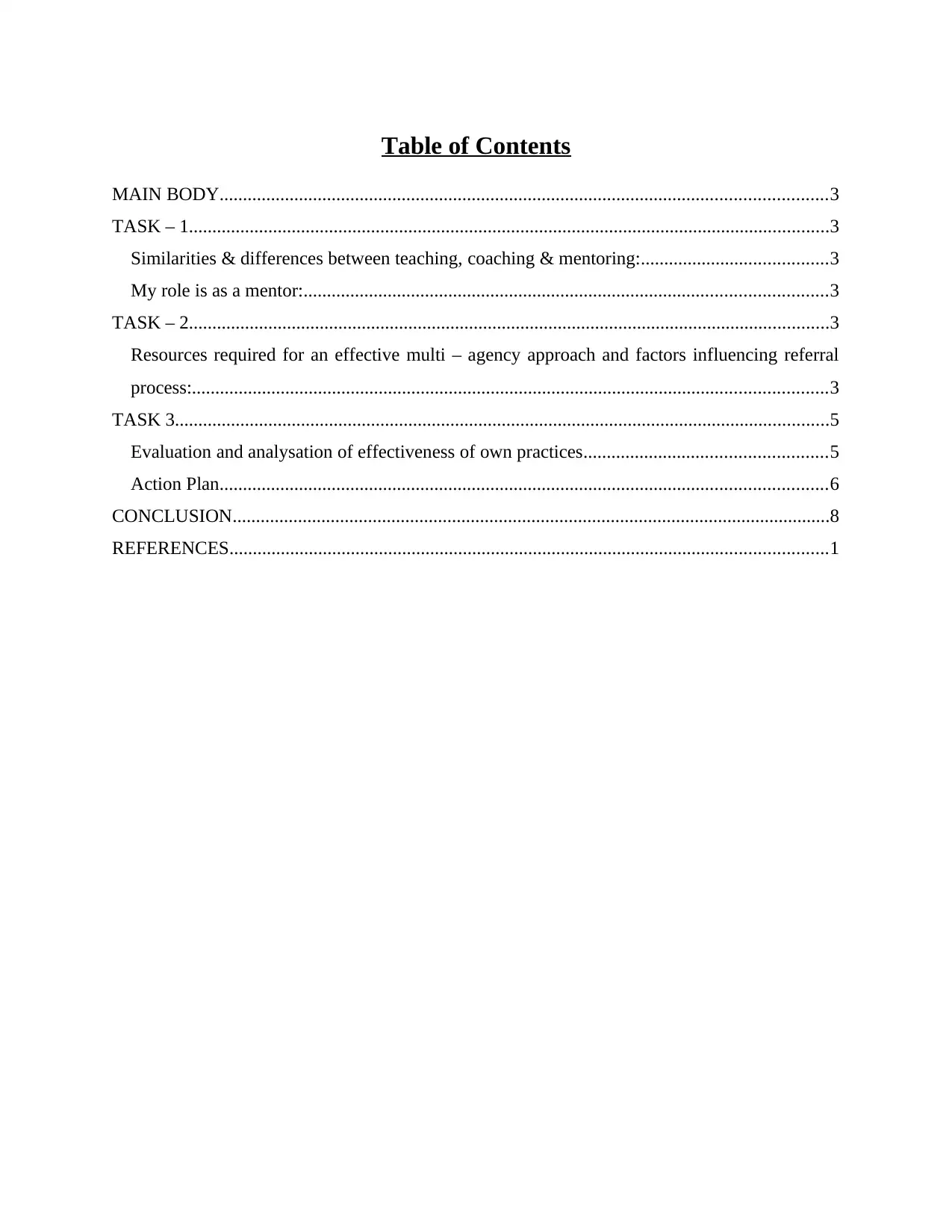
Table of Contents
MAIN BODY..................................................................................................................................3
TASK – 1.........................................................................................................................................3
Similarities & differences between teaching, coaching & mentoring:........................................3
My role is as a mentor:................................................................................................................3
TASK – 2.........................................................................................................................................3
Resources required for an effective multi – agency approach and factors influencing referral
process:........................................................................................................................................3
TASK 3............................................................................................................................................5
Evaluation and analysation of effectiveness of own practices....................................................5
Action Plan..................................................................................................................................6
CONCLUSION................................................................................................................................8
REFERENCES................................................................................................................................1
MAIN BODY..................................................................................................................................3
TASK – 1.........................................................................................................................................3
Similarities & differences between teaching, coaching & mentoring:........................................3
My role is as a mentor:................................................................................................................3
TASK – 2.........................................................................................................................................3
Resources required for an effective multi – agency approach and factors influencing referral
process:........................................................................................................................................3
TASK 3............................................................................................................................................5
Evaluation and analysation of effectiveness of own practices....................................................5
Action Plan..................................................................................................................................6
CONCLUSION................................................................................................................................8
REFERENCES................................................................................................................................1
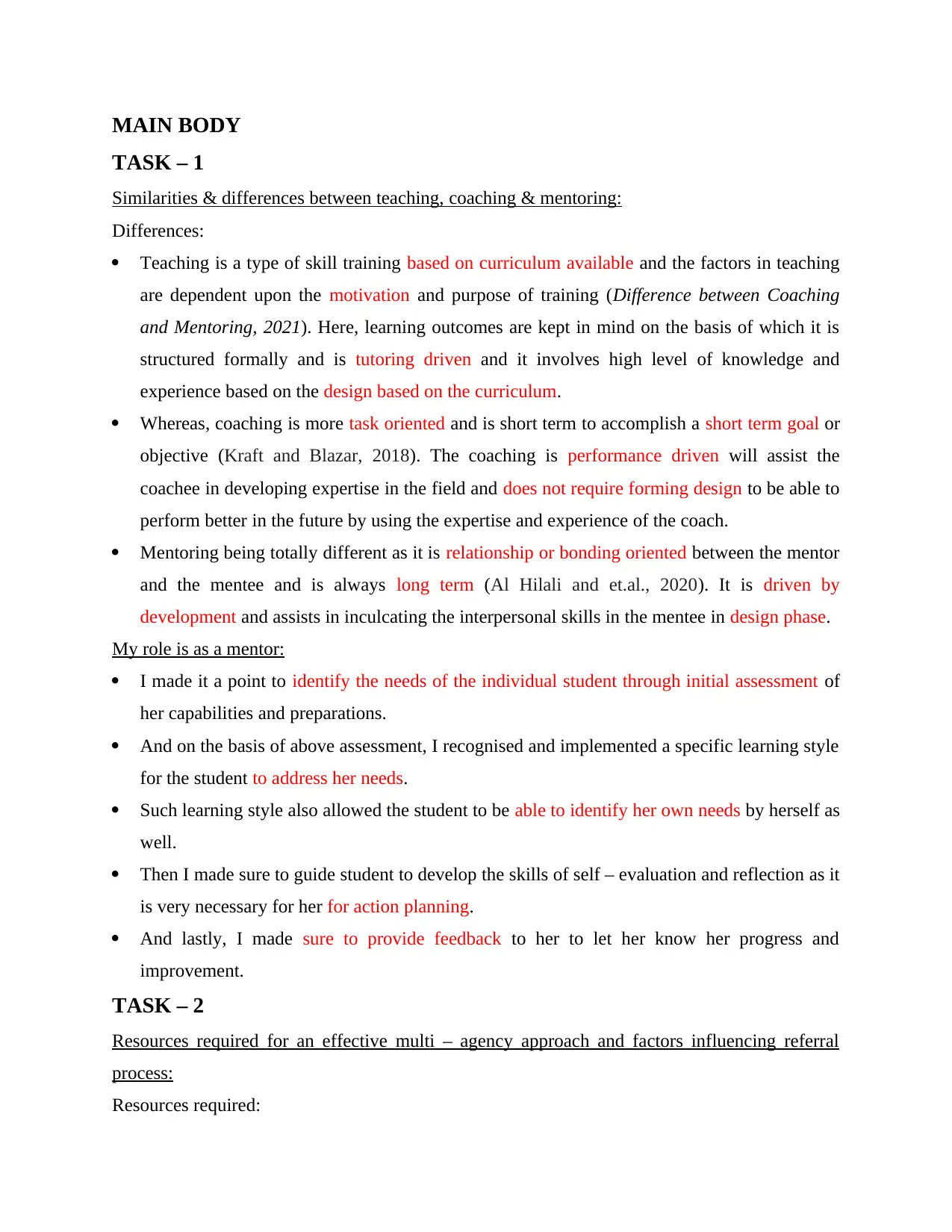
MAIN BODY
TASK – 1
Similarities & differences between teaching, coaching & mentoring:
Differences:
Teaching is a type of skill training based on curriculum available and the factors in teaching
are dependent upon the motivation and purpose of training (Difference between Coaching
and Mentoring, 2021). Here, learning outcomes are kept in mind on the basis of which it is
structured formally and is tutoring driven and it involves high level of knowledge and
experience based on the design based on the curriculum.
Whereas, coaching is more task oriented and is short term to accomplish a short term goal or
objective (Kraft and Blazar, 2018). The coaching is performance driven will assist the
coachee in developing expertise in the field and does not require forming design to be able to
perform better in the future by using the expertise and experience of the coach.
Mentoring being totally different as it is relationship or bonding oriented between the mentor
and the mentee and is always long term (Al Hilali and et.al., 2020). It is driven by
development and assists in inculcating the interpersonal skills in the mentee in design phase.
My role is as a mentor:
I made it a point to identify the needs of the individual student through initial assessment of
her capabilities and preparations.
And on the basis of above assessment, I recognised and implemented a specific learning style
for the student to address her needs.
Such learning style also allowed the student to be able to identify her own needs by herself as
well.
Then I made sure to guide student to develop the skills of self – evaluation and reflection as it
is very necessary for her for action planning.
And lastly, I made sure to provide feedback to her to let her know her progress and
improvement.
TASK – 2
Resources required for an effective multi – agency approach and factors influencing referral
process:
Resources required:
TASK – 1
Similarities & differences between teaching, coaching & mentoring:
Differences:
Teaching is a type of skill training based on curriculum available and the factors in teaching
are dependent upon the motivation and purpose of training (Difference between Coaching
and Mentoring, 2021). Here, learning outcomes are kept in mind on the basis of which it is
structured formally and is tutoring driven and it involves high level of knowledge and
experience based on the design based on the curriculum.
Whereas, coaching is more task oriented and is short term to accomplish a short term goal or
objective (Kraft and Blazar, 2018). The coaching is performance driven will assist the
coachee in developing expertise in the field and does not require forming design to be able to
perform better in the future by using the expertise and experience of the coach.
Mentoring being totally different as it is relationship or bonding oriented between the mentor
and the mentee and is always long term (Al Hilali and et.al., 2020). It is driven by
development and assists in inculcating the interpersonal skills in the mentee in design phase.
My role is as a mentor:
I made it a point to identify the needs of the individual student through initial assessment of
her capabilities and preparations.
And on the basis of above assessment, I recognised and implemented a specific learning style
for the student to address her needs.
Such learning style also allowed the student to be able to identify her own needs by herself as
well.
Then I made sure to guide student to develop the skills of self – evaluation and reflection as it
is very necessary for her for action planning.
And lastly, I made sure to provide feedback to her to let her know her progress and
improvement.
TASK – 2
Resources required for an effective multi – agency approach and factors influencing referral
process:
Resources required:
⊘ This is a preview!⊘
Do you want full access?
Subscribe today to unlock all pages.

Trusted by 1+ million students worldwide
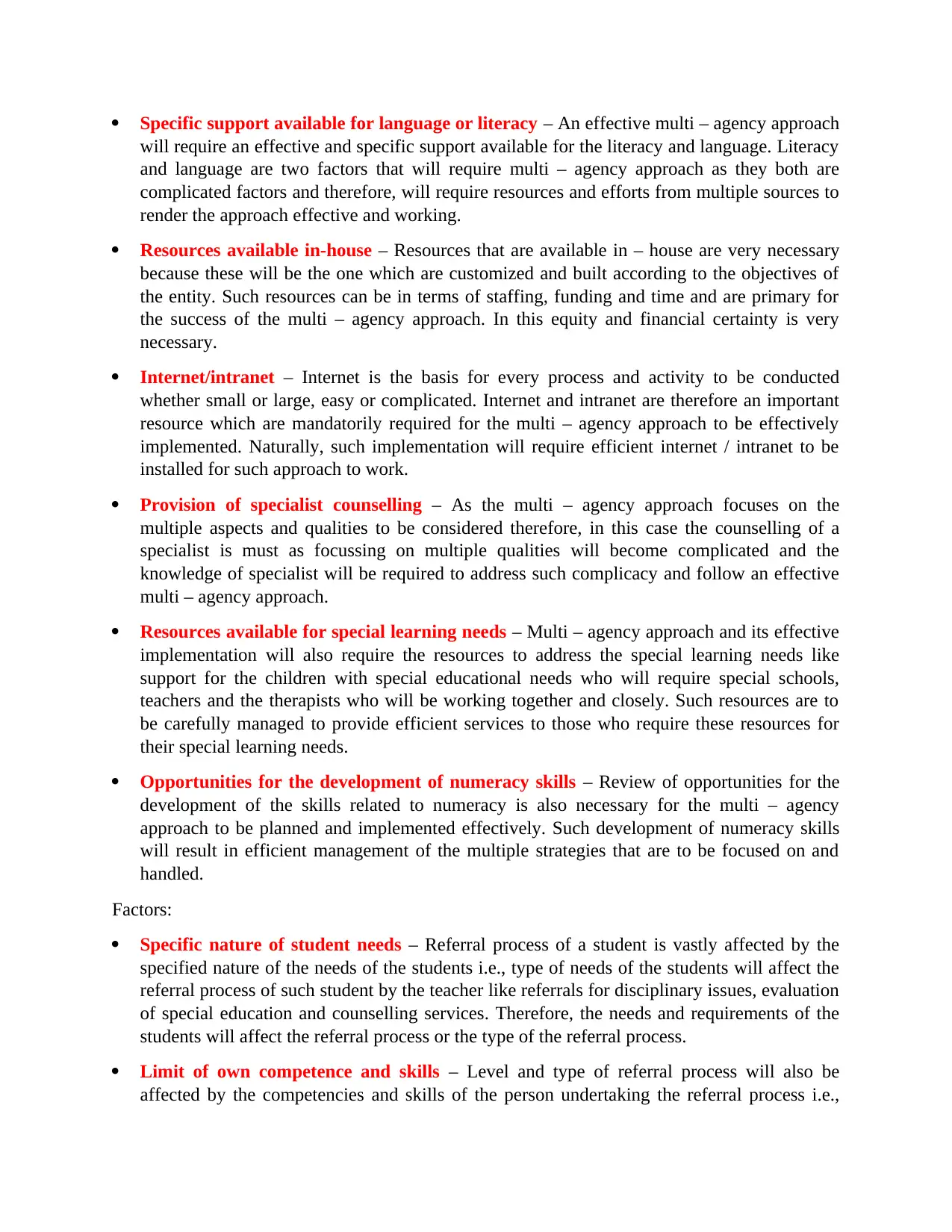
Specific support available for language or literacy – An effective multi – agency approach
will require an effective and specific support available for the literacy and language. Literacy
and language are two factors that will require multi – agency approach as they both are
complicated factors and therefore, will require resources and efforts from multiple sources to
render the approach effective and working.
Resources available in-house – Resources that are available in – house are very necessary
because these will be the one which are customized and built according to the objectives of
the entity. Such resources can be in terms of staffing, funding and time and are primary for
the success of the multi – agency approach. In this equity and financial certainty is very
necessary.
Internet/intranet – Internet is the basis for every process and activity to be conducted
whether small or large, easy or complicated. Internet and intranet are therefore an important
resource which are mandatorily required for the multi – agency approach to be effectively
implemented. Naturally, such implementation will require efficient internet / intranet to be
installed for such approach to work.
Provision of specialist counselling – As the multi – agency approach focuses on the
multiple aspects and qualities to be considered therefore, in this case the counselling of a
specialist is must as focussing on multiple qualities will become complicated and the
knowledge of specialist will be required to address such complicacy and follow an effective
multi – agency approach.
Resources available for special learning needs – Multi – agency approach and its effective
implementation will also require the resources to address the special learning needs like
support for the children with special educational needs who will require special schools,
teachers and the therapists who will be working together and closely. Such resources are to
be carefully managed to provide efficient services to those who require these resources for
their special learning needs.
Opportunities for the development of numeracy skills – Review of opportunities for the
development of the skills related to numeracy is also necessary for the multi – agency
approach to be planned and implemented effectively. Such development of numeracy skills
will result in efficient management of the multiple strategies that are to be focused on and
handled.
Factors:
Specific nature of student needs – Referral process of a student is vastly affected by the
specified nature of the needs of the students i.e., type of needs of the students will affect the
referral process of such student by the teacher like referrals for disciplinary issues, evaluation
of special education and counselling services. Therefore, the needs and requirements of the
students will affect the referral process or the type of the referral process.
Limit of own competence and skills – Level and type of referral process will also be
affected by the competencies and skills of the person undertaking the referral process i.e.,
will require an effective and specific support available for the literacy and language. Literacy
and language are two factors that will require multi – agency approach as they both are
complicated factors and therefore, will require resources and efforts from multiple sources to
render the approach effective and working.
Resources available in-house – Resources that are available in – house are very necessary
because these will be the one which are customized and built according to the objectives of
the entity. Such resources can be in terms of staffing, funding and time and are primary for
the success of the multi – agency approach. In this equity and financial certainty is very
necessary.
Internet/intranet – Internet is the basis for every process and activity to be conducted
whether small or large, easy or complicated. Internet and intranet are therefore an important
resource which are mandatorily required for the multi – agency approach to be effectively
implemented. Naturally, such implementation will require efficient internet / intranet to be
installed for such approach to work.
Provision of specialist counselling – As the multi – agency approach focuses on the
multiple aspects and qualities to be considered therefore, in this case the counselling of a
specialist is must as focussing on multiple qualities will become complicated and the
knowledge of specialist will be required to address such complicacy and follow an effective
multi – agency approach.
Resources available for special learning needs – Multi – agency approach and its effective
implementation will also require the resources to address the special learning needs like
support for the children with special educational needs who will require special schools,
teachers and the therapists who will be working together and closely. Such resources are to
be carefully managed to provide efficient services to those who require these resources for
their special learning needs.
Opportunities for the development of numeracy skills – Review of opportunities for the
development of the skills related to numeracy is also necessary for the multi – agency
approach to be planned and implemented effectively. Such development of numeracy skills
will result in efficient management of the multiple strategies that are to be focused on and
handled.
Factors:
Specific nature of student needs – Referral process of a student is vastly affected by the
specified nature of the needs of the students i.e., type of needs of the students will affect the
referral process of such student by the teacher like referrals for disciplinary issues, evaluation
of special education and counselling services. Therefore, the needs and requirements of the
students will affect the referral process or the type of the referral process.
Limit of own competence and skills – Level and type of referral process will also be
affected by the competencies and skills of the person undertaking the referral process i.e.,
Paraphrase This Document
Need a fresh take? Get an instant paraphrase of this document with our AI Paraphraser
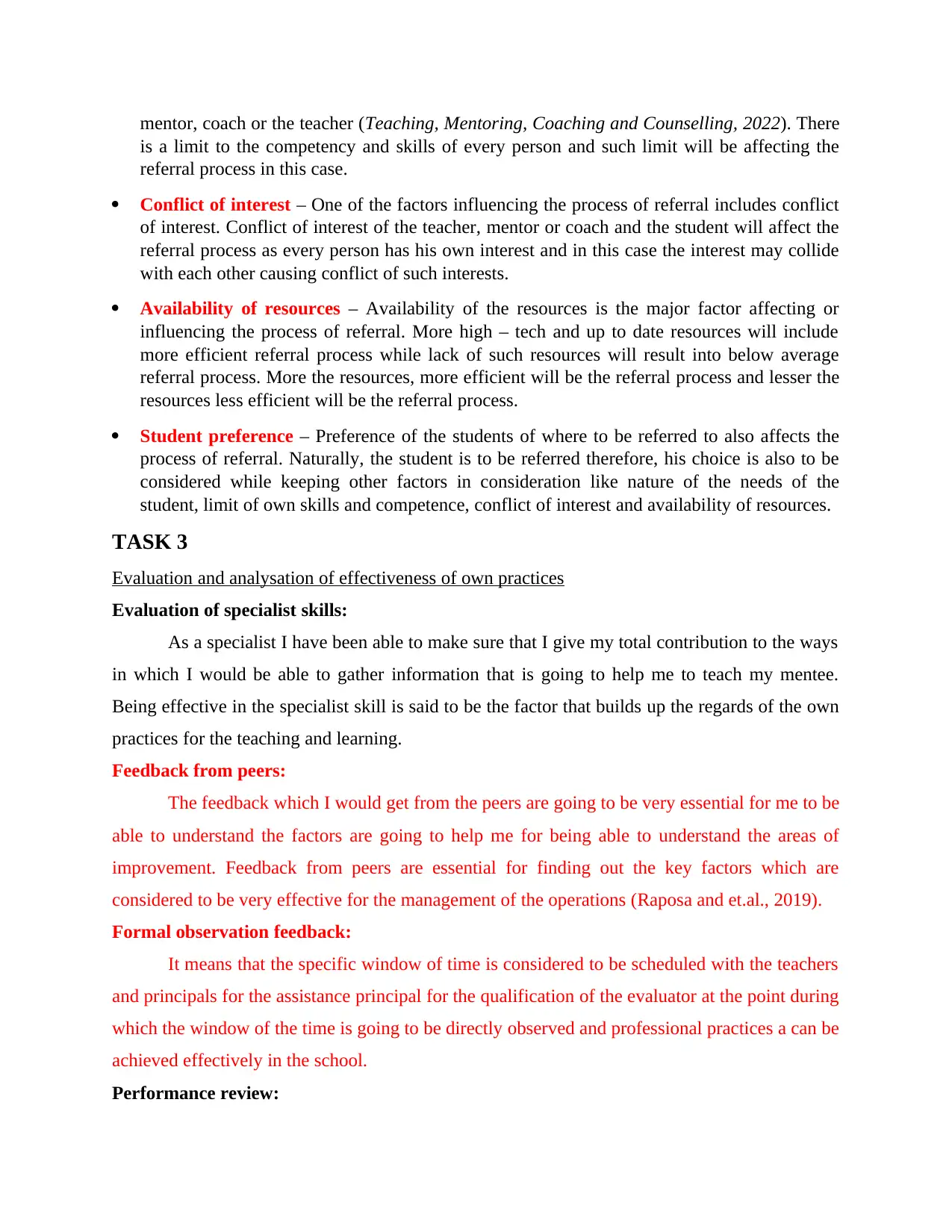
mentor, coach or the teacher (Teaching, Mentoring, Coaching and Counselling, 2022). There
is a limit to the competency and skills of every person and such limit will be affecting the
referral process in this case.
Conflict of interest – One of the factors influencing the process of referral includes conflict
of interest. Conflict of interest of the teacher, mentor or coach and the student will affect the
referral process as every person has his own interest and in this case the interest may collide
with each other causing conflict of such interests.
Availability of resources – Availability of the resources is the major factor affecting or
influencing the process of referral. More high – tech and up to date resources will include
more efficient referral process while lack of such resources will result into below average
referral process. More the resources, more efficient will be the referral process and lesser the
resources less efficient will be the referral process.
Student preference – Preference of the students of where to be referred to also affects the
process of referral. Naturally, the student is to be referred therefore, his choice is also to be
considered while keeping other factors in consideration like nature of the needs of the
student, limit of own skills and competence, conflict of interest and availability of resources.
TASK 3
Evaluation and analysation of effectiveness of own practices
Evaluation of specialist skills:
As a specialist I have been able to make sure that I give my total contribution to the ways
in which I would be able to gather information that is going to help me to teach my mentee.
Being effective in the specialist skill is said to be the factor that builds up the regards of the own
practices for the teaching and learning.
Feedback from peers:
The feedback which I would get from the peers are going to be very essential for me to be
able to understand the factors are going to help me for being able to understand the areas of
improvement. Feedback from peers are essential for finding out the key factors which are
considered to be very effective for the management of the operations (Raposa and et.al., 2019).
Formal observation feedback:
It means that the specific window of time is considered to be scheduled with the teachers
and principals for the assistance principal for the qualification of the evaluator at the point during
which the window of the time is going to be directly observed and professional practices a can be
achieved effectively in the school.
Performance review:
is a limit to the competency and skills of every person and such limit will be affecting the
referral process in this case.
Conflict of interest – One of the factors influencing the process of referral includes conflict
of interest. Conflict of interest of the teacher, mentor or coach and the student will affect the
referral process as every person has his own interest and in this case the interest may collide
with each other causing conflict of such interests.
Availability of resources – Availability of the resources is the major factor affecting or
influencing the process of referral. More high – tech and up to date resources will include
more efficient referral process while lack of such resources will result into below average
referral process. More the resources, more efficient will be the referral process and lesser the
resources less efficient will be the referral process.
Student preference – Preference of the students of where to be referred to also affects the
process of referral. Naturally, the student is to be referred therefore, his choice is also to be
considered while keeping other factors in consideration like nature of the needs of the
student, limit of own skills and competence, conflict of interest and availability of resources.
TASK 3
Evaluation and analysation of effectiveness of own practices
Evaluation of specialist skills:
As a specialist I have been able to make sure that I give my total contribution to the ways
in which I would be able to gather information that is going to help me to teach my mentee.
Being effective in the specialist skill is said to be the factor that builds up the regards of the own
practices for the teaching and learning.
Feedback from peers:
The feedback which I would get from the peers are going to be very essential for me to be
able to understand the factors are going to help me for being able to understand the areas of
improvement. Feedback from peers are essential for finding out the key factors which are
considered to be very effective for the management of the operations (Raposa and et.al., 2019).
Formal observation feedback:
It means that the specific window of time is considered to be scheduled with the teachers
and principals for the assistance principal for the qualification of the evaluator at the point during
which the window of the time is going to be directly observed and professional practices a can be
achieved effectively in the school.
Performance review:
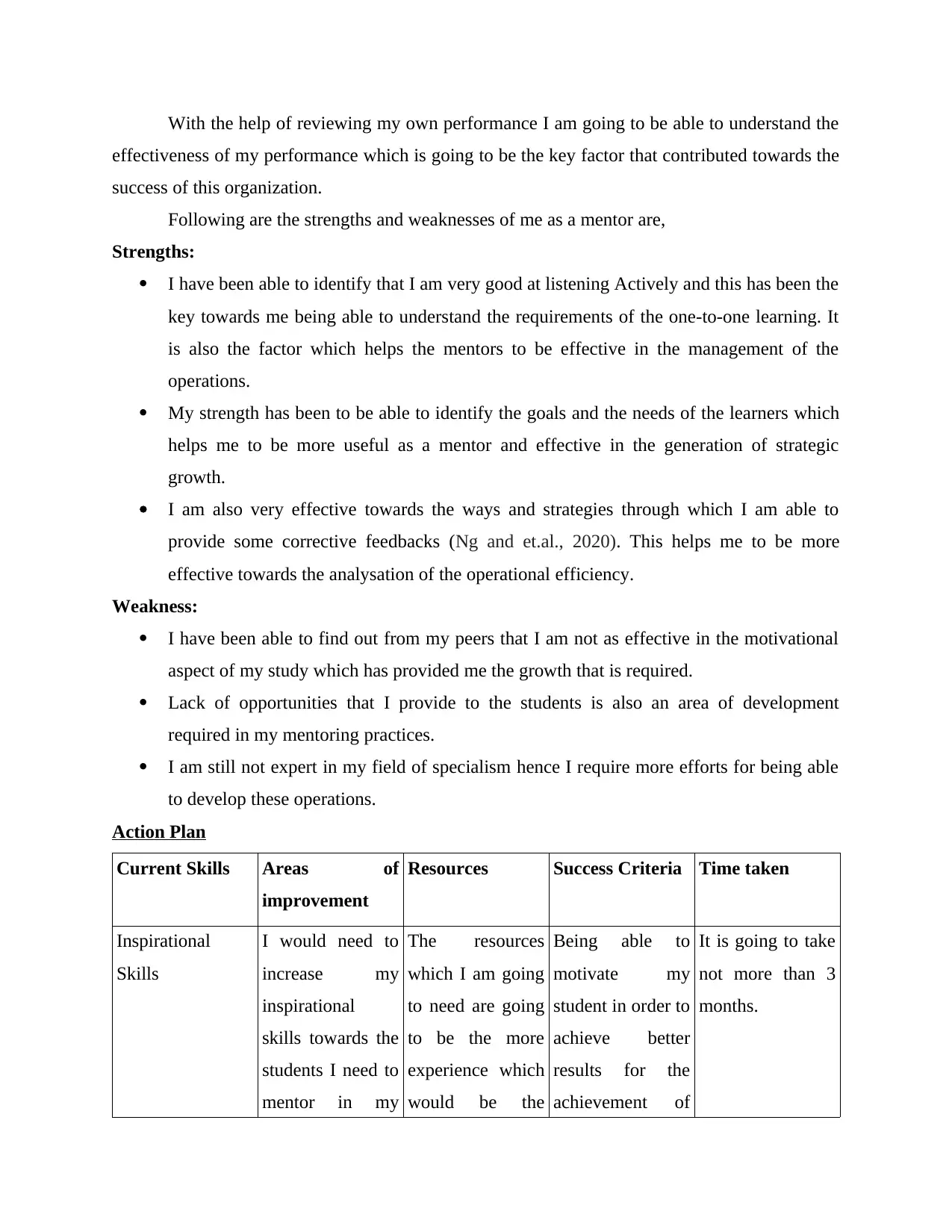
With the help of reviewing my own performance I am going to be able to understand the
effectiveness of my performance which is going to be the key factor that contributed towards the
success of this organization.
Following are the strengths and weaknesses of me as a mentor are,
Strengths:
I have been able to identify that I am very good at listening Actively and this has been the
key towards me being able to understand the requirements of the one-to-one learning. It
is also the factor which helps the mentors to be effective in the management of the
operations.
My strength has been to be able to identify the goals and the needs of the learners which
helps me to be more useful as a mentor and effective in the generation of strategic
growth.
I am also very effective towards the ways and strategies through which I am able to
provide some corrective feedbacks (Ng and et.al., 2020). This helps me to be more
effective towards the analysation of the operational efficiency.
Weakness:
I have been able to find out from my peers that I am not as effective in the motivational
aspect of my study which has provided me the growth that is required.
Lack of opportunities that I provide to the students is also an area of development
required in my mentoring practices.
I am still not expert in my field of specialism hence I require more efforts for being able
to develop these operations.
Action Plan
Current Skills Areas of
improvement
Resources Success Criteria Time taken
Inspirational
Skills
I would need to
increase my
inspirational
skills towards the
students I need to
mentor in my
The resources
which I am going
to need are going
to be the more
experience which
would be the
Being able to
motivate my
student in order to
achieve better
results for the
achievement of
It is going to take
not more than 3
months.
effectiveness of my performance which is going to be the key factor that contributed towards the
success of this organization.
Following are the strengths and weaknesses of me as a mentor are,
Strengths:
I have been able to identify that I am very good at listening Actively and this has been the
key towards me being able to understand the requirements of the one-to-one learning. It
is also the factor which helps the mentors to be effective in the management of the
operations.
My strength has been to be able to identify the goals and the needs of the learners which
helps me to be more useful as a mentor and effective in the generation of strategic
growth.
I am also very effective towards the ways and strategies through which I am able to
provide some corrective feedbacks (Ng and et.al., 2020). This helps me to be more
effective towards the analysation of the operational efficiency.
Weakness:
I have been able to find out from my peers that I am not as effective in the motivational
aspect of my study which has provided me the growth that is required.
Lack of opportunities that I provide to the students is also an area of development
required in my mentoring practices.
I am still not expert in my field of specialism hence I require more efforts for being able
to develop these operations.
Action Plan
Current Skills Areas of
improvement
Resources Success Criteria Time taken
Inspirational
Skills
I would need to
increase my
inspirational
skills towards the
students I need to
mentor in my
The resources
which I am going
to need are going
to be the more
experience which
would be the
Being able to
motivate my
student in order to
achieve better
results for the
achievement of
It is going to take
not more than 3
months.
⊘ This is a preview!⊘
Do you want full access?
Subscribe today to unlock all pages.

Trusted by 1+ million students worldwide
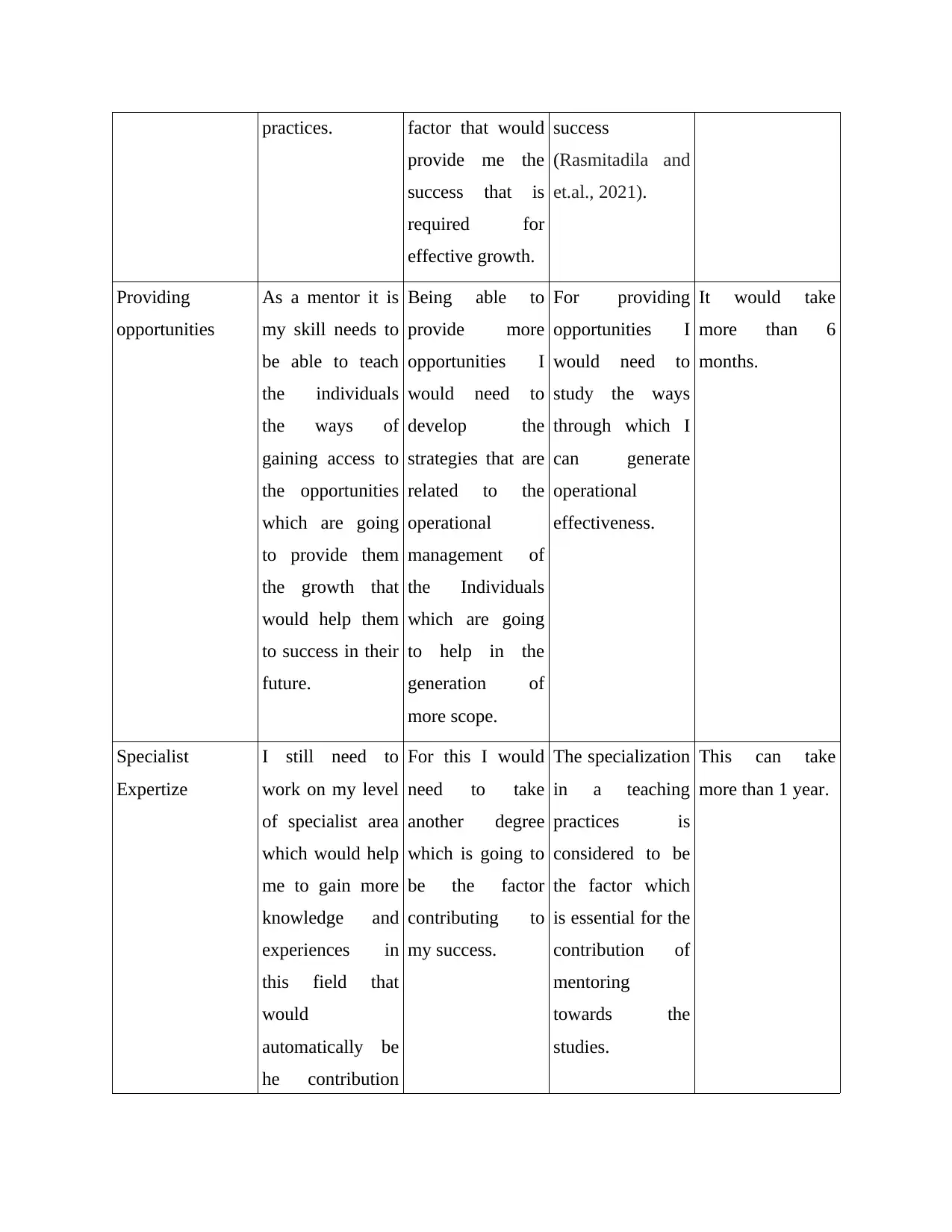
practices. factor that would
provide me the
success that is
required for
effective growth.
success
(Rasmitadila and
et.al., 2021).
Providing
opportunities
As a mentor it is
my skill needs to
be able to teach
the individuals
the ways of
gaining access to
the opportunities
which are going
to provide them
the growth that
would help them
to success in their
future.
Being able to
provide more
opportunities I
would need to
develop the
strategies that are
related to the
operational
management of
the Individuals
which are going
to help in the
generation of
more scope.
For providing
opportunities I
would need to
study the ways
through which I
can generate
operational
effectiveness.
It would take
more than 6
months.
Specialist
Expertize
I still need to
work on my level
of specialist area
which would help
me to gain more
knowledge and
experiences in
this field that
would
automatically be
he contribution
For this I would
need to take
another degree
which is going to
be the factor
contributing to
my success.
The specialization
in a teaching
practices is
considered to be
the factor which
is essential for the
contribution of
mentoring
towards the
studies.
This can take
more than 1 year.
provide me the
success that is
required for
effective growth.
success
(Rasmitadila and
et.al., 2021).
Providing
opportunities
As a mentor it is
my skill needs to
be able to teach
the individuals
the ways of
gaining access to
the opportunities
which are going
to provide them
the growth that
would help them
to success in their
future.
Being able to
provide more
opportunities I
would need to
develop the
strategies that are
related to the
operational
management of
the Individuals
which are going
to help in the
generation of
more scope.
For providing
opportunities I
would need to
study the ways
through which I
can generate
operational
effectiveness.
It would take
more than 6
months.
Specialist
Expertize
I still need to
work on my level
of specialist area
which would help
me to gain more
knowledge and
experiences in
this field that
would
automatically be
he contribution
For this I would
need to take
another degree
which is going to
be the factor
contributing to
my success.
The specialization
in a teaching
practices is
considered to be
the factor which
is essential for the
contribution of
mentoring
towards the
studies.
This can take
more than 1 year.
Paraphrase This Document
Need a fresh take? Get an instant paraphrase of this document with our AI Paraphraser
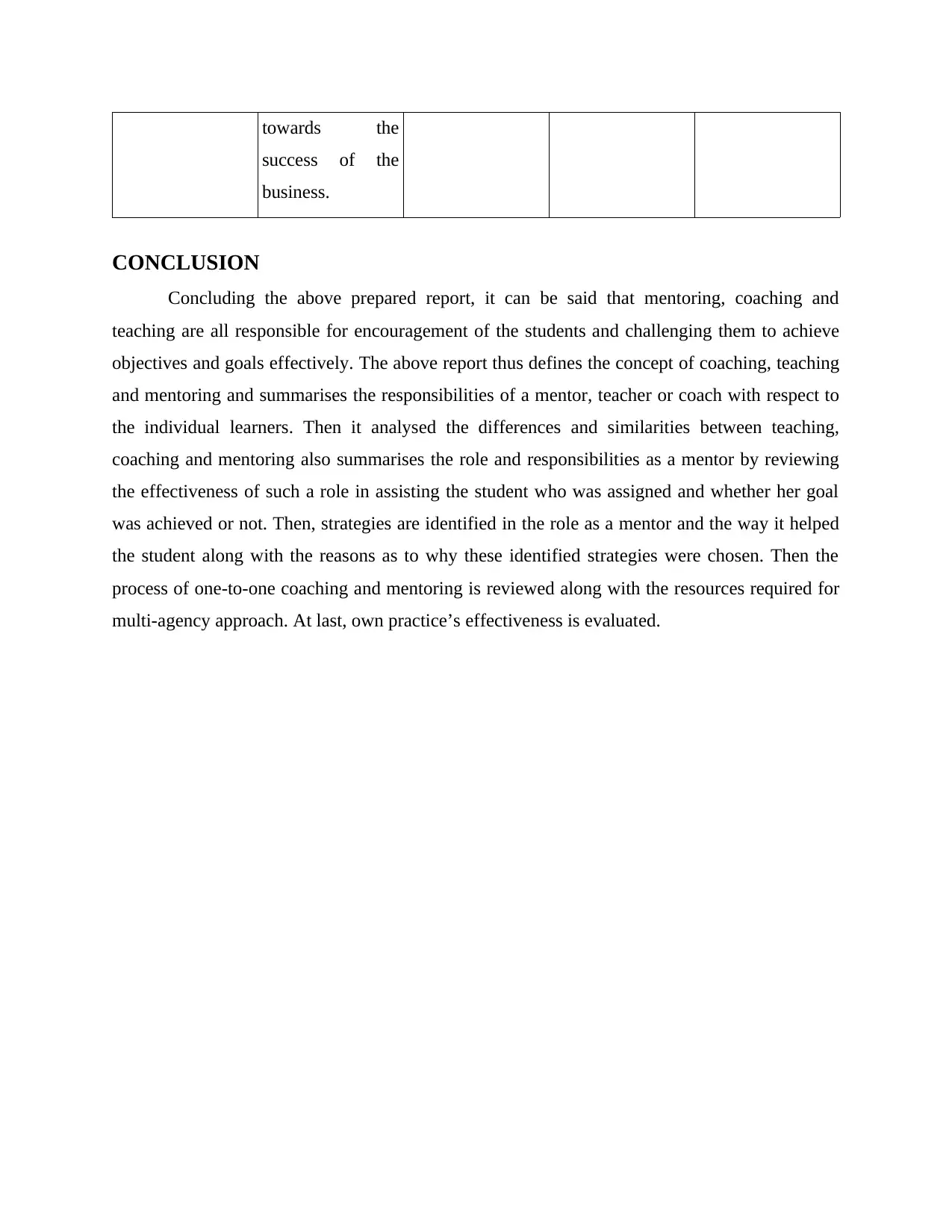
towards the
success of the
business.
CONCLUSION
Concluding the above prepared report, it can be said that mentoring, coaching and
teaching are all responsible for encouragement of the students and challenging them to achieve
objectives and goals effectively. The above report thus defines the concept of coaching, teaching
and mentoring and summarises the responsibilities of a mentor, teacher or coach with respect to
the individual learners. Then it analysed the differences and similarities between teaching,
coaching and mentoring also summarises the role and responsibilities as a mentor by reviewing
the effectiveness of such a role in assisting the student who was assigned and whether her goal
was achieved or not. Then, strategies are identified in the role as a mentor and the way it helped
the student along with the reasons as to why these identified strategies were chosen. Then the
process of one-to-one coaching and mentoring is reviewed along with the resources required for
multi-agency approach. At last, own practice’s effectiveness is evaluated.
success of the
business.
CONCLUSION
Concluding the above prepared report, it can be said that mentoring, coaching and
teaching are all responsible for encouragement of the students and challenging them to achieve
objectives and goals effectively. The above report thus defines the concept of coaching, teaching
and mentoring and summarises the responsibilities of a mentor, teacher or coach with respect to
the individual learners. Then it analysed the differences and similarities between teaching,
coaching and mentoring also summarises the role and responsibilities as a mentor by reviewing
the effectiveness of such a role in assisting the student who was assigned and whether her goal
was achieved or not. Then, strategies are identified in the role as a mentor and the way it helped
the student along with the reasons as to why these identified strategies were chosen. Then the
process of one-to-one coaching and mentoring is reviewed along with the resources required for
multi-agency approach. At last, own practice’s effectiveness is evaluated.
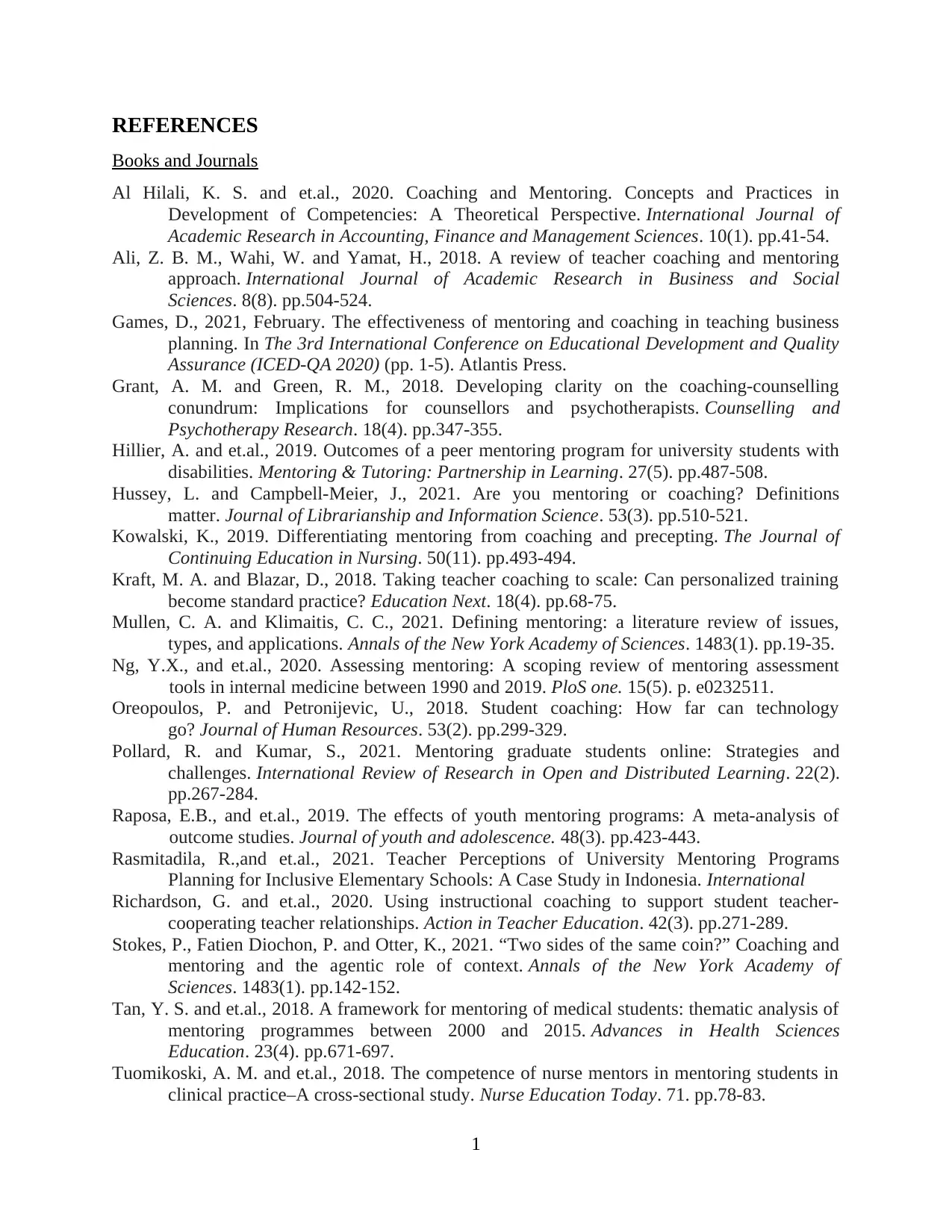
REFERENCES
Books and Journals
Al Hilali, K. S. and et.al., 2020. Coaching and Mentoring. Concepts and Practices in
Development of Competencies: A Theoretical Perspective. International Journal of
Academic Research in Accounting, Finance and Management Sciences. 10(1). pp.41-54.
Ali, Z. B. M., Wahi, W. and Yamat, H., 2018. A review of teacher coaching and mentoring
approach. International Journal of Academic Research in Business and Social
Sciences. 8(8). pp.504-524.
Games, D., 2021, February. The effectiveness of mentoring and coaching in teaching business
planning. In The 3rd International Conference on Educational Development and Quality
Assurance (ICED-QA 2020) (pp. 1-5). Atlantis Press.
Grant, A. M. and Green, R. M., 2018. Developing clarity on the coaching‐counselling
conundrum: Implications for counsellors and psychotherapists. Counselling and
Psychotherapy Research. 18(4). pp.347-355.
Hillier, A. and et.al., 2019. Outcomes of a peer mentoring program for university students with
disabilities. Mentoring & Tutoring: Partnership in Learning. 27(5). pp.487-508.
Hussey, L. and Campbell-Meier, J., 2021. Are you mentoring or coaching? Definitions
matter. Journal of Librarianship and Information Science. 53(3). pp.510-521.
Kowalski, K., 2019. Differentiating mentoring from coaching and precepting. The Journal of
Continuing Education in Nursing. 50(11). pp.493-494.
Kraft, M. A. and Blazar, D., 2018. Taking teacher coaching to scale: Can personalized training
become standard practice? Education Next. 18(4). pp.68-75.
Mullen, C. A. and Klimaitis, C. C., 2021. Defining mentoring: a literature review of issues,
types, and applications. Annals of the New York Academy of Sciences. 1483(1). pp.19-35.
Ng, Y.X., and et.al., 2020. Assessing mentoring: A scoping review of mentoring assessment
tools in internal medicine between 1990 and 2019. PloS one. 15(5). p. e0232511.
Oreopoulos, P. and Petronijevic, U., 2018. Student coaching: How far can technology
go? Journal of Human Resources. 53(2). pp.299-329.
Pollard, R. and Kumar, S., 2021. Mentoring graduate students online: Strategies and
challenges. International Review of Research in Open and Distributed Learning. 22(2).
pp.267-284.
Raposa, E.B., and et.al., 2019. The effects of youth mentoring programs: A meta-analysis of
outcome studies. Journal of youth and adolescence. 48(3). pp.423-443.
Rasmitadila, R.,and et.al., 2021. Teacher Perceptions of University Mentoring Programs
Planning for Inclusive Elementary Schools: A Case Study in Indonesia. International
Richardson, G. and et.al., 2020. Using instructional coaching to support student teacher-
cooperating teacher relationships. Action in Teacher Education. 42(3). pp.271-289.
Stokes, P., Fatien Diochon, P. and Otter, K., 2021. “Two sides of the same coin?” Coaching and
mentoring and the agentic role of context. Annals of the New York Academy of
Sciences. 1483(1). pp.142-152.
Tan, Y. S. and et.al., 2018. A framework for mentoring of medical students: thematic analysis of
mentoring programmes between 2000 and 2015. Advances in Health Sciences
Education. 23(4). pp.671-697.
Tuomikoski, A. M. and et.al., 2018. The competence of nurse mentors in mentoring students in
clinical practice–A cross-sectional study. Nurse Education Today. 71. pp.78-83.
1
Books and Journals
Al Hilali, K. S. and et.al., 2020. Coaching and Mentoring. Concepts and Practices in
Development of Competencies: A Theoretical Perspective. International Journal of
Academic Research in Accounting, Finance and Management Sciences. 10(1). pp.41-54.
Ali, Z. B. M., Wahi, W. and Yamat, H., 2018. A review of teacher coaching and mentoring
approach. International Journal of Academic Research in Business and Social
Sciences. 8(8). pp.504-524.
Games, D., 2021, February. The effectiveness of mentoring and coaching in teaching business
planning. In The 3rd International Conference on Educational Development and Quality
Assurance (ICED-QA 2020) (pp. 1-5). Atlantis Press.
Grant, A. M. and Green, R. M., 2018. Developing clarity on the coaching‐counselling
conundrum: Implications for counsellors and psychotherapists. Counselling and
Psychotherapy Research. 18(4). pp.347-355.
Hillier, A. and et.al., 2019. Outcomes of a peer mentoring program for university students with
disabilities. Mentoring & Tutoring: Partnership in Learning. 27(5). pp.487-508.
Hussey, L. and Campbell-Meier, J., 2021. Are you mentoring or coaching? Definitions
matter. Journal of Librarianship and Information Science. 53(3). pp.510-521.
Kowalski, K., 2019. Differentiating mentoring from coaching and precepting. The Journal of
Continuing Education in Nursing. 50(11). pp.493-494.
Kraft, M. A. and Blazar, D., 2018. Taking teacher coaching to scale: Can personalized training
become standard practice? Education Next. 18(4). pp.68-75.
Mullen, C. A. and Klimaitis, C. C., 2021. Defining mentoring: a literature review of issues,
types, and applications. Annals of the New York Academy of Sciences. 1483(1). pp.19-35.
Ng, Y.X., and et.al., 2020. Assessing mentoring: A scoping review of mentoring assessment
tools in internal medicine between 1990 and 2019. PloS one. 15(5). p. e0232511.
Oreopoulos, P. and Petronijevic, U., 2018. Student coaching: How far can technology
go? Journal of Human Resources. 53(2). pp.299-329.
Pollard, R. and Kumar, S., 2021. Mentoring graduate students online: Strategies and
challenges. International Review of Research in Open and Distributed Learning. 22(2).
pp.267-284.
Raposa, E.B., and et.al., 2019. The effects of youth mentoring programs: A meta-analysis of
outcome studies. Journal of youth and adolescence. 48(3). pp.423-443.
Rasmitadila, R.,and et.al., 2021. Teacher Perceptions of University Mentoring Programs
Planning for Inclusive Elementary Schools: A Case Study in Indonesia. International
Richardson, G. and et.al., 2020. Using instructional coaching to support student teacher-
cooperating teacher relationships. Action in Teacher Education. 42(3). pp.271-289.
Stokes, P., Fatien Diochon, P. and Otter, K., 2021. “Two sides of the same coin?” Coaching and
mentoring and the agentic role of context. Annals of the New York Academy of
Sciences. 1483(1). pp.142-152.
Tan, Y. S. and et.al., 2018. A framework for mentoring of medical students: thematic analysis of
mentoring programmes between 2000 and 2015. Advances in Health Sciences
Education. 23(4). pp.671-697.
Tuomikoski, A. M. and et.al., 2018. The competence of nurse mentors in mentoring students in
clinical practice–A cross-sectional study. Nurse Education Today. 71. pp.78-83.
1
⊘ This is a preview!⊘
Do you want full access?
Subscribe today to unlock all pages.

Trusted by 1+ million students worldwide
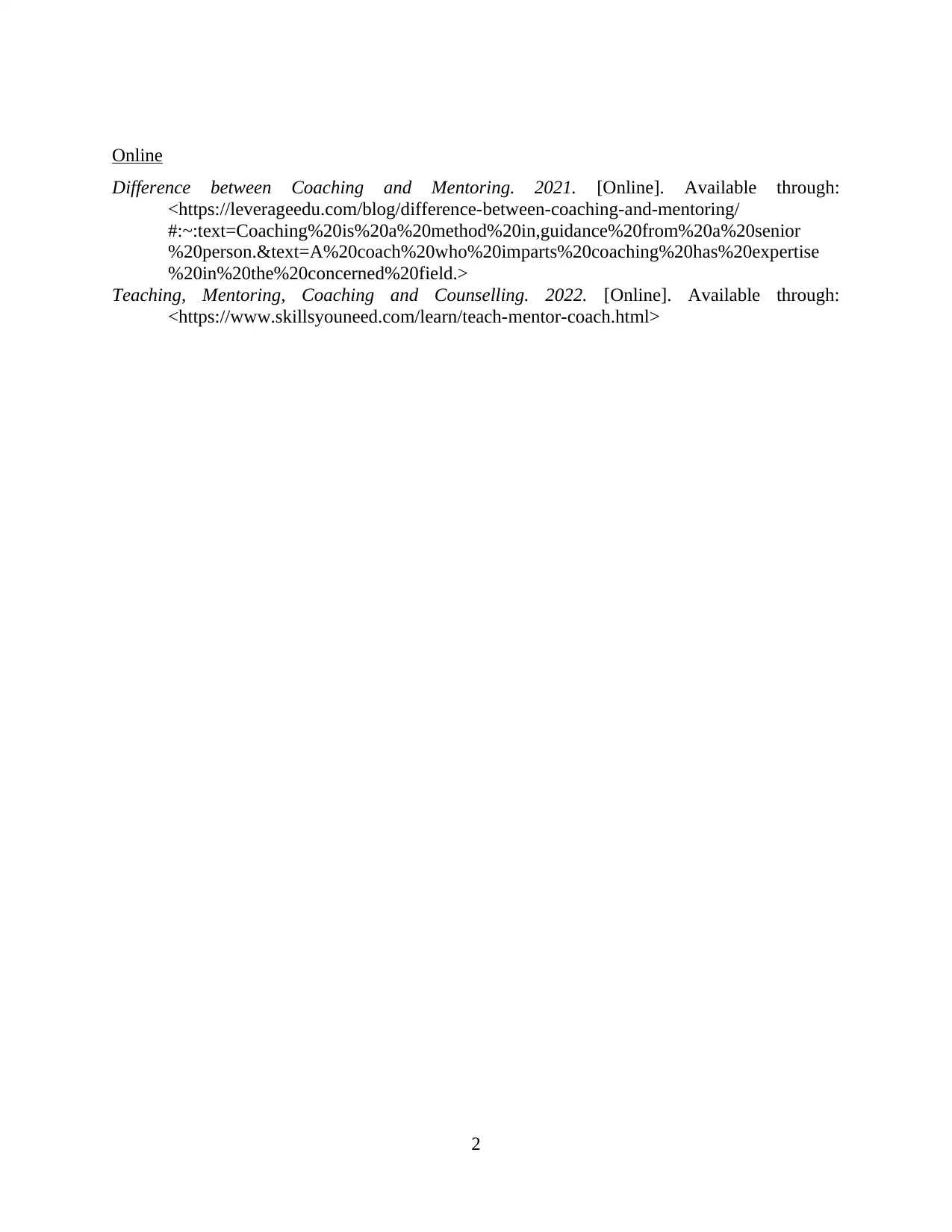
Online
Difference between Coaching and Mentoring. 2021. [Online]. Available through:
<https://leverageedu.com/blog/difference-between-coaching-and-mentoring/
#:~:text=Coaching%20is%20a%20method%20in,guidance%20from%20a%20senior
%20person.&text=A%20coach%20who%20imparts%20coaching%20has%20expertise
%20in%20the%20concerned%20field.>
Teaching, Mentoring, Coaching and Counselling. 2022. [Online]. Available through:
<https://www.skillsyouneed.com/learn/teach-mentor-coach.html>
2
Difference between Coaching and Mentoring. 2021. [Online]. Available through:
<https://leverageedu.com/blog/difference-between-coaching-and-mentoring/
#:~:text=Coaching%20is%20a%20method%20in,guidance%20from%20a%20senior
%20person.&text=A%20coach%20who%20imparts%20coaching%20has%20expertise
%20in%20the%20concerned%20field.>
Teaching, Mentoring, Coaching and Counselling. 2022. [Online]. Available through:
<https://www.skillsyouneed.com/learn/teach-mentor-coach.html>
2
1 out of 10
Related Documents
Your All-in-One AI-Powered Toolkit for Academic Success.
+13062052269
info@desklib.com
Available 24*7 on WhatsApp / Email
![[object Object]](/_next/static/media/star-bottom.7253800d.svg)
Unlock your academic potential
Copyright © 2020–2026 A2Z Services. All Rights Reserved. Developed and managed by ZUCOL.




